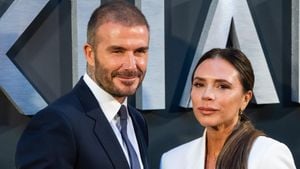Following Donald Trump's recent victory, all eyes are on Robert F. Kennedy Jr., who seems poised to play a significant role in the newly elected administration. This potential influence raises questions about the future of public health policy, particularly concerning vaccines and additional public health initiatives. With Kennedy serving as the face of vaccine skepticism, many experts worry about the ramifications his presence could have on vaccine rates and public health.
Trump, during his campaign, suggested he would allow Kennedy to take the reins when it came to health issues, stating he would let him “go wild” on health policies. While the exact role hasn't been defined, speculations suggest it could involve overseeing major health agencies such as the Centers for Disease Control and Prevention (CDC) or the Food and Drug Administration (FDA). This is alarming to many public health officials.
The prospect of Kennedy, who has long promoted conspiracy theories about vaccines—including the debunked belief linking vaccines to autism—heading up health initiatives has worried pediatricians and public health advocates alike. Concerns are being voiced about the possible resurgence of diseases previously controlled by vaccines. Dr. Jerome Adams, Trump's former surgeon general, cautioned about Kennedy's impact on the nation's willingness to keep up with routine vaccinations.
Public health professionals raised flags about the current climate of vaccine hesitancy, highlighting troubling statistics. Routine childhood vaccinations have been declining, exemptions from vaccination requirements are on the rise, and cases of preventable illnesses such as measles are creeping up across the United States. The CDC's recent report indicated 15 measles outbreaks totaling 272 cases, with the majority affecting children under five years old. Pediatricians worry about what this means for children, with some doctors having already witnessed the devastating effects of vaccine-preventable diseases.
Despite Kennedy's anti-vaccine leanings, he has publicly stated he does not intend to remove vaccines from the marketplace. He recently told NBC News, "If vaccines are working for somebody, I’m not going to take them away. People ought to have choice, and choice ought to be informed by the best information." His comments, though seemingly reassuring, leave many health experts incredulous about their sincerity, considering his previous rhetoric around vaccines. Kennedy's role could allow him to propagate misinformation and undermine public trust, potentially exacerbated by Trump's support.
During the campaign, Kennedy indicated his intention to clean up corruption within federal agencies. He expressed concern over the prevalence of ingredients deemed unsafe for consumption, alluding to foods allowed within the U.S. market but banned elsewhere. This approach aligns with his past remarks about federal oversight, presenting it as part of his broader agenda against perceived governmental overreach.
One of his specific targets appears to be fluoride, commonly added to public drinking water to promote dental health. Kennedy aims to remove fluoride from municipal water supplies, asserting its negative health effects, even as reputable health organizations continue to endorse its safety and efficacy. While Trump’s encouragement of Kennedy’s plans has been apparent, the actual implementation remains ambiguous, particularly concerning scientific guidelines and the potential impact on public health.
Kennedy also took the opportunity to float ideas about removing corporate influences from the governmental process, aligning himself with those who believe regulatory bodies are too allied with pharmaceutical companies. His position could lead to significant changes within government agencies, particularly if he influences appointments within the FDA or CDC. Health experts fear this approach could divert attention from pressing public health challenges and impede efficacy, particularly concerning vaccines.
To many, Kennedy's rise within Trump’s administration spells uncertainty. Public health professionals have also cited concerns about his lack of medical or scientific qualifications, pointing out his background as an environmental lawyer rather than one steeped deeply within health sciences. His focus on conspiracy theories, such as linking vaccines to increases in chronic diseases, undermines the consensus among health professionals about public health goals.
The healthcare community has voiced concerns over Kennedy's ability to influence vaccine administration and recommend practices contrary to accepted public health measures. Given Trump's statement about seeking advice from Kennedy on vaccine regulations, experts believe this could lead to drastic changes even though federal requirements for vaccines remain governed at the state level.
While Trump's loyal supporters view Kennedy's presence as beneficial for dismantling established protocols perceived as ineffective, the broader population exhibits vast skepticism of Kennedy's claims. His goals, which include permission to dictate health research, could lead to the adoption of unfounded practices, threatening years of healthcare advocacy work. Some researchers warn these sentiments could lead to detrimental public health policy resulting from misinformation proliferated through social media.
Preparation for Kennedy's anticipated role is under scrutiny. Pediatricians and public health advocates are already preparing for what may come based on Trump's platform of skepticism toward scientifically validated health recommendations. With the looming specter of disease outbreaks attributed to misinformation and negligence surrounding vaccines, there’s strong pressure on the incoming administration to commit to science-based health policies.
The community continues to grapple with the fact behind Kennedy’s past behaviors, forecasting potential turbulence as he seeks to steer public policies away from what many view as the scientific consensus. With this influx of skepticism at the helm of health agencies, numerous doctors fear facing active threats to herd immunity and rising rates of preventable diseases, stemming entirely from individuals like Kennedy being situated within influential government roles.
For Kennedy, this prospective position carries weight on his past campaigning and public view, representing the complex interplay of belief and politics. The possibility of joining Trump once again formalizes fears, drawing critics from every corner ranging from public health officials to the general populace. Seeking balance between personal convictions and public duty may be the hardest challenge as Kennedy prepares to address the growing demands of health policy reform and accountability as he transitions from candidate to potential health czar.



